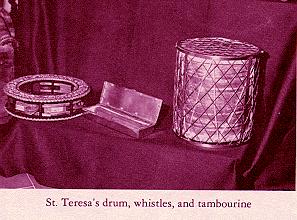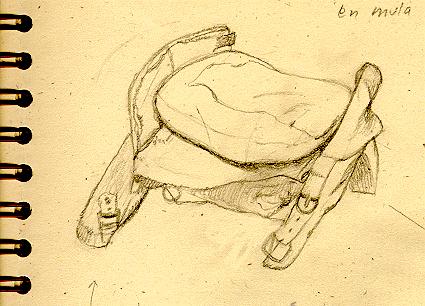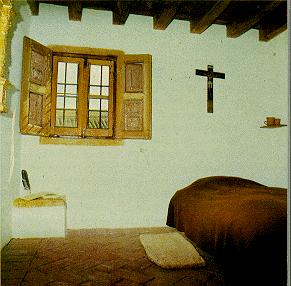 Chapter Six: A Drawing and a Meeting
Chapter Six: A Drawing and a Meeting

 I wanted Annette to see the small museum at San José, the first convent of the Carmelite Reform founded by
St. Teresa, so we went that afternoon. The museum has some of Teresa's relics : a tibia, a silver awl she
used to doctor her nuns by bloodletting, together with the basin the blood was let into, her saddle, her empty
coffin (because her body, minus some parts, was reclaimed by the convent in which she died, in Alba de
Tormes), her silver flute and tambourine, some autograph manuscript pages, and a reconstruction of her
cell, in which she wrote The Way of Perfection (still in print, available in paperback).
I wanted Annette to see the small museum at San José, the first convent of the Carmelite Reform founded by
St. Teresa, so we went that afternoon. The museum has some of Teresa's relics : a tibia, a silver awl she
used to doctor her nuns by bloodletting, together with the basin the blood was let into, her saddle, her empty
coffin (because her body, minus some parts, was reclaimed by the convent in which she died, in Alba de
Tormes), her silver flute and tambourine, some autograph manuscript pages, and a reconstruction of her
cell, in which she wrote The Way of Perfection (still in print, available in paperback).

 I had already been to this
museum three times during my two previous stays in Avila. Each time I would
give my 100 peseta coin for admission to a thin, high shouldered young woman with glasses who hunched
over a book behind the souvenir counter. Like all museum keepers in Spain, she kept an eye on my
progress, turning on the lights as I moved towards an exhibit and turning off the lights behind me. She
spoke no English.
I had already been to this
museum three times during my two previous stays in Avila. Each time I would
give my 100 peseta coin for admission to a thin, high shouldered young woman with glasses who hunched
over a book behind the souvenir counter. Like all museum keepers in Spain, she kept an eye on my
progress, turning on the lights as I moved towards an exhibit and turning off the lights behind me. She
spoke no English.
 I brought my sketch book with me. I drew la Santa's saddle (tamuga) in
pencil, and did a quick sketch of
her cell (celda) behind its grilled window, trying to get the proportions right.
The second time I went I started
again on the cell and got it better roughed out before becoming a little tired and frustrated in the dim light.
I brought my sketch book with me. I drew la Santa's saddle (tamuga) in
pencil, and did a quick sketch of
her cell (celda) behind its grilled window, trying to get the proportions right.
The second time I went I started
again on the cell and got it better roughed out before becoming a little tired and frustrated in the dim light.
 It was two days later before I found the museum open again so I could finish the drawing. I said hello and
handed over my coin, headed for the cell exhibit, and was beginning to get well into the drawing. I heard
the keeper talking with Spanish visitors who asked if they could see the cloister. She explained it was
It was two days later before I found the museum open again so I could finish the drawing. I said hello and
handed over my coin, headed for the cell exhibit, and was beginning to get well into the drawing. I heard
the keeper talking with Spanish visitors who asked if they could see the cloister. She explained it was
 enclosed and therefore they could not. I went on drawing. Soon she came over to me and said, "You've
been here before, haven't you?" I said yes. "You're English?" "American." She asked what I was doing
and I showed her the drawing. She smiled and complimented it, and added "
¿Tienes un gran devoción a
la Santa, sí?" I said yes, and told her in my primitive Spanish, that I was in
Spain to visit all of the places
where foundations were made by Santa Teresa, and as she nodded, I added that I tell the story of Santa
Teresa to business people ("gentes de comercio") in the U.S., that the story is
very important because
of its spirituality. She nodded and smiled. "You know, you can see the church." "When?" I asked. "As soon
as you're finished."
enclosed and therefore they could not. I went on drawing. Soon she came over to me and said, "You've
been here before, haven't you?" I said yes. "You're English?" "American." She asked what I was doing
and I showed her the drawing. She smiled and complimented it, and added "
¿Tienes un gran devoción a
la Santa, sí?" I said yes, and told her in my primitive Spanish, that I was in
Spain to visit all of the places
where foundations were made by Santa Teresa, and as she nodded, I added that I tell the story of Santa
Teresa to business people ("gentes de comercio") in the U.S., that the story is
very important because
of its spirituality. She nodded and smiled. "You know, you can see the church." "When?" I asked. "As soon
as you're finished."
Chapter 7: Invisible Voices,
List of Chapters, or Back Home

 I had already been to this
museum three times during my two previous stays in Avila. Each time I would
give my 100 peseta coin for admission to a thin, high shouldered young woman with glasses who hunched
over a book behind the souvenir counter. Like all museum keepers in Spain, she kept an eye on my
progress, turning on the lights as I moved towards an exhibit and turning off the lights behind me. She
spoke no English.
I had already been to this
museum three times during my two previous stays in Avila. Each time I would
give my 100 peseta coin for admission to a thin, high shouldered young woman with glasses who hunched
over a book behind the souvenir counter. Like all museum keepers in Spain, she kept an eye on my
progress, turning on the lights as I moved towards an exhibit and turning off the lights behind me. She
spoke no English.  enclosed and therefore they could not. I went on drawing. Soon she came over to me and said, "You've
been here before, haven't you?" I said yes. "You're English?" "American." She asked what I was doing
and I showed her the drawing. She smiled and complimented it, and added "
¿Tienes un gran devoción a
la Santa, sí?" I said yes, and told her in my primitive Spanish, that I was in
Spain to visit all of the places
where foundations were made by Santa Teresa, and as she nodded, I added that I tell the story of Santa
Teresa to business people ("gentes de comercio") in the U.S., that the story is
very important because
of its spirituality. She nodded and smiled. "You know, you can see the church." "When?" I asked. "As soon
as you're finished."
enclosed and therefore they could not. I went on drawing. Soon she came over to me and said, "You've
been here before, haven't you?" I said yes. "You're English?" "American." She asked what I was doing
and I showed her the drawing. She smiled and complimented it, and added "
¿Tienes un gran devoción a
la Santa, sí?" I said yes, and told her in my primitive Spanish, that I was in
Spain to visit all of the places
where foundations were made by Santa Teresa, and as she nodded, I added that I tell the story of Santa
Teresa to business people ("gentes de comercio") in the U.S., that the story is
very important because
of its spirituality. She nodded and smiled. "You know, you can see the church." "When?" I asked. "As soon
as you're finished."  Chapter Six: A Drawing and a Meeting
Chapter Six: A Drawing and a Meeting